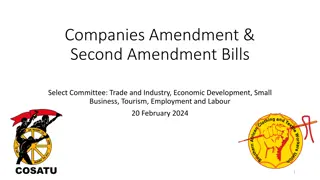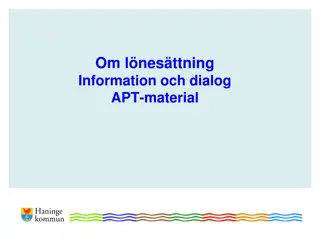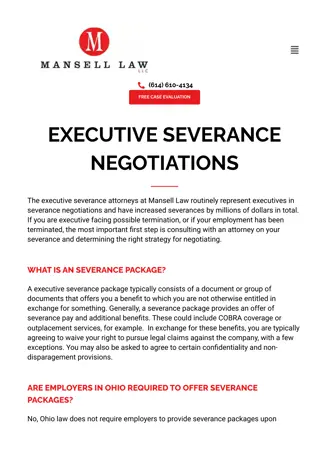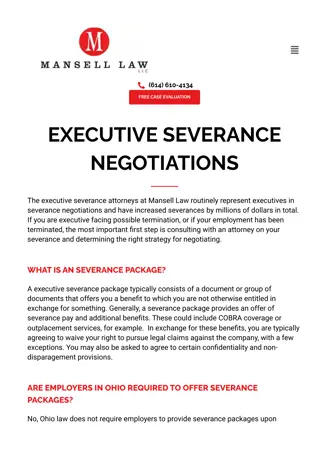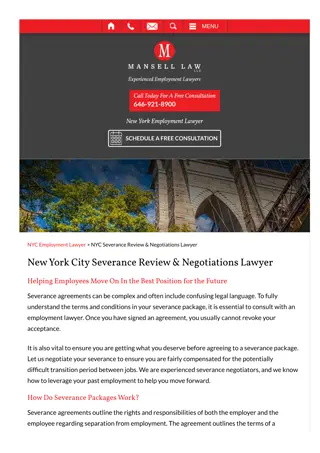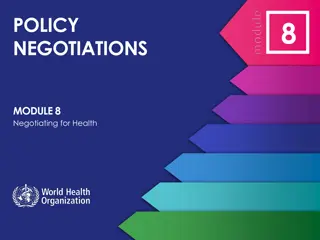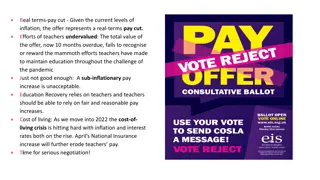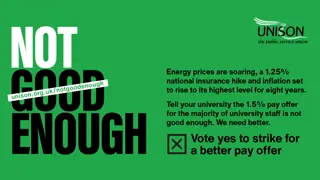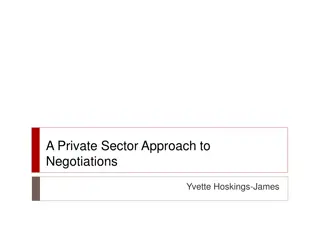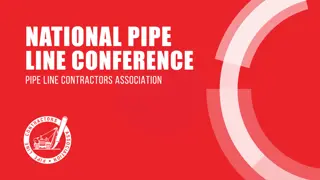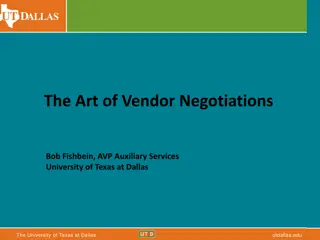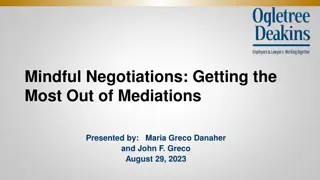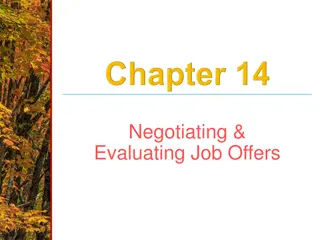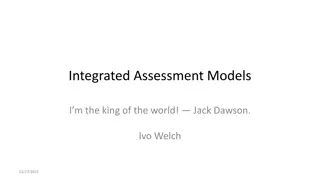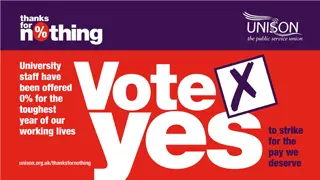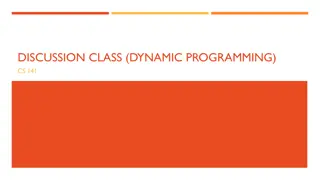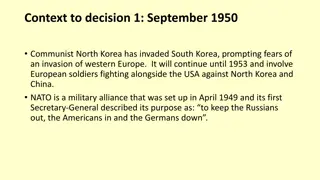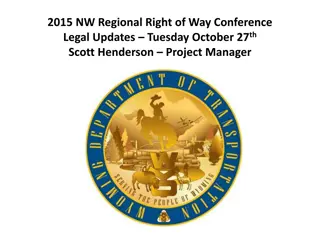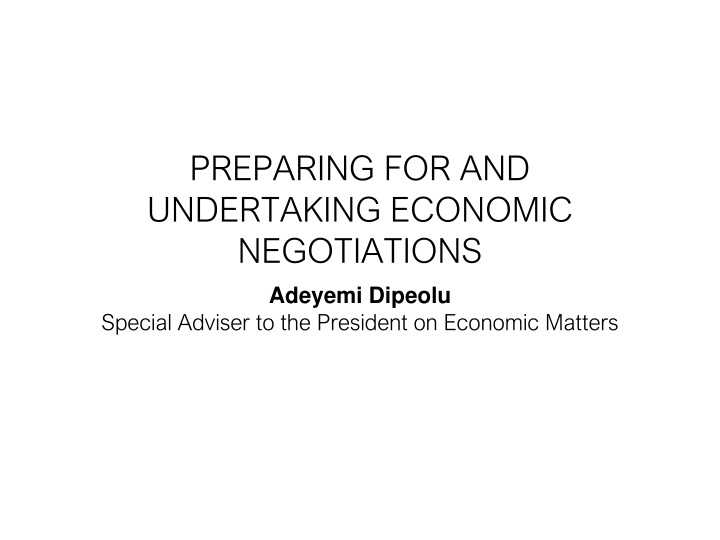
Maximizing Economic Negotiations: Strategies for Success
In the realm of economic negotiations, understanding the intricacies of multilateral and bilateral agreements is crucial. This workshop led by Adeyemi Dipeolu, Special Adviser to the President on Economic Matters, sheds light on the significance of well-structured agreements to combat illicit financial flows. Delve into the complexities of international negotiations and explore notable economic agreements shaping global trade, investment, and regulatory cooperation. Discover the impact of poorly negotiated agreements on financial outflows and learn how to navigate the landscape of international economic cooperation effectively.
Download Presentation

Please find below an Image/Link to download the presentation.
The content on the website is provided AS IS for your information and personal use only. It may not be sold, licensed, or shared on other websites without obtaining consent from the author. If you encounter any issues during the download, it is possible that the publisher has removed the file from their server.
You are allowed to download the files provided on this website for personal or commercial use, subject to the condition that they are used lawfully. All files are the property of their respective owners.
The content on the website is provided AS IS for your information and personal use only. It may not be sold, licensed, or shared on other websites without obtaining consent from the author.
E N D
Presentation Transcript
PREPARING FOR AND UNDERTAKING ECONOMIC NEGOTIATIONS Adeyemi Dipeolu Special Adviser to the President on Economic Matters
Purpose of Workshop It has been established that one of the most identifiable ways through which illicit financial flows happen are poorly negotiated and hidden contracts The Inter-Agency Committee against Illicit Financial Flows from Nigeria thought it would be useful to organise this workshop to highlight the issues involved to a wider audience It is in our view also prudent to begin to develop a crop of Nigerian officials skilled in international negotiations in general with specialisation in key thematic areas
Multilateral and Bilateral Agreements Frame International Economic Cooperation International economic cooperation is governed by agreements reached at multilateral and bilateral levels Such agreements take place in multilateral forums like the United Nations & the World Trade Organisation, regional and sub-regional forums like the African Union and ECOWAS and between groups of States or two State Parties There are various types of international agreements ranging from from the formal such as treaties, charters, agreements, conventions and protocols to the informal such as communiques, declarations and decisions International agreements cover a wide range of subject areas like Political and Security, Economic and Financial, Natural Resources, and Administrative
Notable International Economic Agreements International Economic Agreements cover development issues, financial matters, contractual issues and regulatory cooperation Some well known international economic agreements cover trade, investment, double taxation, natural resources and environmental issues. This workshop will focus on these to start with Some other agreements cover air services, fishing rights, shipping rights, bilateral aid, loans and project finance
International Agreements Matter Some studies have shown that there can be serious financial outflows from poorly negotiated international agreements A study by Action Aid estimated that losses to some countries from withholding tax and outgoing dividend and interest payments provisions in double taxation agreements was quite high. In Philippines for example it was $509m or 0.17% of GDP There are several instances of how bilateral investment treaties have proved costly to countries. Between 2003 and 2007, Argentina faced a slew of cases against it with cases based on its BIT asking for compensation of a total of $80 billion which was 13% of its GDP at the time There are several others in which potential losses could be serious, P&ID case, outcome of COP 26, rules of origin and transshipment in regional integration agreements
Practical Tips for Successful Negotiations The rest of this presentation will focus on practical tips for successful negotiations These tips are derived from my personal experience and should of course be used in context and complemented by your own reading, observations, practice and experience
Prepare, Prepare, Prepare One of the most important things in undertaking negotiations is preparation. Assemble a strong inter-disciplinary team Be throughly familiar with the subject area Research into the specific issues involved Know or determine the venue, agenda and level at which the talks will be held
Clarity of Objectives Know your negotiating objectives a priori Obtain a negotiating mandate - apart from giving clarity to what is expected of you, it protects you from the use of political power Establish a ranking of your preferred outcomes and degree of flexibility on each item. Some would be essential on others you can be flexible but do not give them away without getting something in return Consider alternative but acceptable outcomes
Assemble a Strong Team One of the key preparatory requirements to have a strong team The composition of the negotiating team is very important. It should as much as possible be inter-disciplinary but it should also reflect different strengths. In the Nigerian context this would mean drawing on colleagues from different agencies. There should be a clear team leader who does the talking, there should be researchers on different topics, there should be those tasked with studying the other side and their reactions to proposals made and those in charge of drafting proposals
Know the Other Side A key requiring in undertaking negotiations is to know the other side. In bilateral negotiations - the country involved, in multilateral negotiations the block involved Try to understand their motivations Glean their priorities from their reputation in the area and the proposals they make Study the make-up of their negotiators
Be Focussed But Constructive Negotiations are undertaken by people so there is a human element involved Personal rapport helps to build trust and promotes a desire to reach a mutually acceptable outcome Negotiations however are about promoting, preserving and protecting interests and not a social event. Do not be hostile but do not be unduly flattered Try to see issues from the other sides perspective so as to know what they can and cannot give up. With such knowledge in mind be constructive and innovative in coming up with proposals that can be mutually beneficial
Master Negotiating Tactics Negotiators must have an arsenal of tactics in their toolkit Where possible try to introduce your own draft as the working document Learn to buy time for especially in order to buy time for consultations with your team or your principals Do not allow yourself to be time pressured but try to apply it to the other side Try to capture issues that have been agreed in writing even if the negotiations are not complete. It is avoid this situation that some countries insist that nothing is agreed until everything is agreed
Communication is Everything Communications are intrinsic to negotiations in the sense that if they are not clear things could be misheard or even misunderstood. This points to the importance of having good translators and interpreters when different languages are spoken Ensure that you convey your position clearly for thought does not mean said; said does not mean heard; heard does not mean understood and understood does not mean agreed Listen closely to the other side including by asking for clarifications and watching body language. Listen to what has not been said
A Bad Deal is No Deal Many negotiators are under the impression that they must reach an agreement but since agreements are ultimately about your interests a bad deal is no deal. This is more so as agreements must be implementable. Always keep your negotiating mandate and objectives in mind and be prepared to work away from the table if need be This is not the same thing as leaving the table at the first deadlock. Deadlocks will happen but they should be used to find creative solutions or as a negotiating tactic to wear the other side down. Where possible it is important to have a Plan B or the best alternative outcome in terms of your objectives. This is why it is useful to be clear about the issues on which you can afford to be flexible and make concessions Do not use the threat of a walk away as your first negotiating tactic. It can backfire if the other side calls your bluff
Dispute Settlement Matters The flip side of an Agreement is a dispute which is not surprising if we consider the existence of commercial courts, arbitration panels and dispute settlement mechanisms It is therefore somewhat surprising that Nigeria along with many other developing countries do not pay close attention to issues of dispute settlement As many examples show most of the illicit outflows from poorly negotiated contracts can be linked to unfavourable dispute settlement clauses. It is therefore important to pay close attention to the procedures for settling disputes, the venue for such settlements, the mode and indeed the geo-political configuration of dispute settlement panels Where possible disputes on local economic matters should be settled in the country except of course for multilateral and regional integration agreements that might provide for specific dispute settlement arrangements Where possible in multilateral or bilateral Agreements an effort should be made for revision or termination of the Agreement so that if it does not work out well in practice it is possible to exit without too much costs
Comply with Legal Requirements Close attention should be paid to legal procedures to validate Agreements It is important to be clear about our domestic requirements for validating agreements and ensuring that the relevant provisions meet such requirements. Some questions to ask are whether the agreement requires signature only, whether it needs to be approved or ratified at a particular level of authority Close attention should also be paid to when the agreement is expected to come into force taking account of whether our local conditions will enable such
Conclusion These tips are not exhaustive You should develop your own repertoire of strategies and tactics The key is to experience and participate actively in negotiations. Early and continuous exposure is essential in this regard Feedback would be appreciated to help improve this workshop which we hope will continue well into the future Thank you

